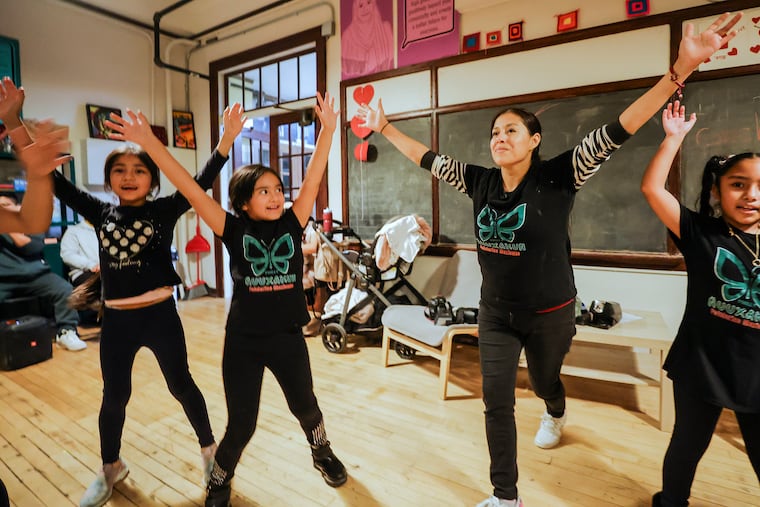A Philly dance group is helping Mexican American children connect to their roots
Ñuuxakun offers a bilingual and bicultural experience for kids in South Philadelphia, and has several upcoming holiday performances.

Andrea Garcia was a professional folklore dancer in her native Mexico. But, after moving to Philly in 2016, she became a domestic worker. As a way to help her three kids connect with their Mexican identity and take a break from electronics, she cocreated Ñuuxakun in 2021. The dance group offers a bilingual and bicultural experience for kids in South Philadelphia, and has developed a following over the last year, with several forthcoming holiday performances.
Ñuuxakun means “people who laugh” in Mixteco, an ancestral Indigenous language. At a recent weeknight rehearsal, as children happily play and count their tempos, the name sounds fitting.
In the group of 31 children, some of the dancers don’t speak Spanish, some don’t speak English, and others are fully bilingual. It doesn’t much matter once they enter their rehearsal room at the Bok Building.
The language impact of a bilingual group
“I used to think that only one language fit in one person,” said 8-year-old dancer Bryan Sandoval, of South Philadelphia. “When I started coming to the group … I was shocked to see that wasn’t true. My mom had told me people spoke more than Spanish, but I thought she was playing!”
Dancing in this multicultural environment for the last two years helped him adapt to speaking both languages ahead of his transition into a bilingual school.
For 7-year-old Rosario Juárez, the group has become a lifeline to her culture, after her school “strongly advised” her parents to stop speaking Spanish to her.
“She was shy and wouldn’t speak to her teacher or her classmates,” said Juárez’s mom, Juana Aguilar Ozorno. “They said it was because we spoke Spanish at home, and that their only solution was to only talk to her in English. Now she doesn’t speak Spanish.”
Aguilar Ozorno drives 30 minutes from Pennsauken to bring Rosario to the three weekly rehearsals. She said dancing at Ñuuxakun has helped her daughter break out of her shell and understand more Spanish, even if she doesn’t yet speak it.
Helping children settle into their identity
As dances are choreographed, children learn the cultural meaning and the history behind them.
“The parents and I teach the kids about traditions, how we used to celebrate back home, and what it means for our community,” Garcia said.
That knowledge has given kids a sense of pride in what their community has to offer and the spaces they can have as Mexican Americans.
Until she joined Ñuuxakun, Michelle Sandoval, Bryan’s 12-year-old sister, didn’t believe dance was for her.
“I have never seen dancers who looked like me, so I assumed it wasn’t something people like me could do,” Michelle Sandoval said. “This has been a great opportunity and now I am comfortable and feel like even if we are not perfect, we are unique in our own way.”
For Liam Luna, 15, the group provided a space to learn about Mexican history, culture, and contributions in a way he had never experienced in school.
“I am more proud to be Mexican now,” the South Philadelphia teenager said. “[Dancing here] has opened a part of me that I didn’t even know was there because I didn’t feel this way before; now I am invested in keeping in contact with my culture,” he added.
The struggle
Despite how much commitment the parents and students have put into dancing, Garcia has struggled to find a steady place to rehearse.
“This is not a business for me, this is about the community,” she said.
Classes cost $5 and the group meets three times a week for two hours. Kids under 5 can attend for free, and parents who cannot afford the fee can still send their children.
“All children are welcome no matter the race, language, or cultural background,” said Garcia. “The parents are great, they do the makeup, costumes, and scenery, but we have struggled to find a steady place to be.”
When the group began, the Italian Market restaurant Alma del Mar let the kids rehearse on their patio. In 2022, the group grew and the South Philly Church of the Crucifixion became the new location.
After the church needed repairs, Ñuuxakun managed to get Bok’s gym for rehearsal. But, the space is too cold during winter so the group must use a smaller room.
Despite the difficulty of finding a permanent space, the group has found success, with presentations at Penn Museum, Bok, Cantina la Martina, and other venues around the city.
This winter season, the group is preparing a posada presentation that will be showcased at Bok’s Winter Market on Saturday, at Expo-sada and Tianguis holiday market on Sunday, at Iglesias Garden in late December, and at the Kimmel Center on Jan. 6.